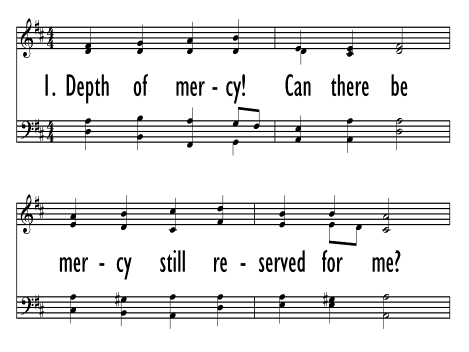Depth of mercy, can there be. C. Wesley. [Desiring Mercy and Pardon.] First published in Hymns & Sacred Poems, 1740, and headed "After a Relapse into Sin," in 13 stanzas of 4 lines, Poetical Works, 1868-72, vol. i. p. 271. When included in the Wesleyan Hymn Book, 1780, No. 162, stanza iii. was omitted, and stanza viii. was included in stanza ii., the result being 6 stanzas of 8 lines. This arrangement was continued in later editions, and has passed into other collections, both in Great Britain and America. In Stevenson's Methodist Hymn Book, and its Associations, 1870-83, is an interesting and pathetic account of an actress and her change of life through the instrumentality of this hymn. The account has been repeated in many books and in various forms. It is of American origin, and first appeared, as far as can be traced, in Belcher's Historical Notes on Hymns and Authors. Although possibly true, it lacks authentication. No one has yet ventured to say whether the circumstance occurred in Great Britain or America, or whether it was in the last century or in this. Failing these details, we are not surprised that the names of the town and of the actress are both wanting.
--John Julian, Dictionary of Hymnology (1907)


 My Starred Hymns
My Starred Hymns






